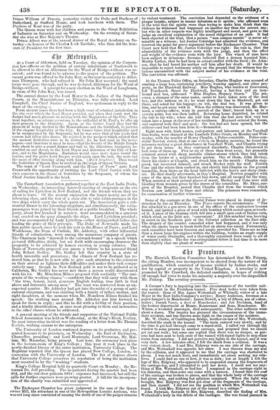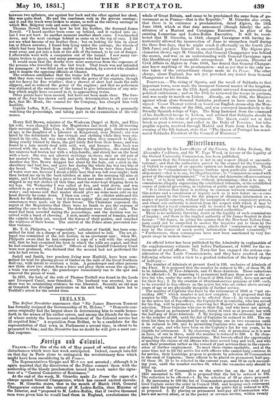Vrauturto.
The Harwich Election Committee has determined that Mr. Prinsep, the sitting Member, was incompetent to be elected from the nature of his qualification, which consisted of income yielded by Indian stocks, and not by capital or property in the United Kingdom. A scrutiny is now promoted by Mr. Crawford, the defeated candidate, in hopes of striking off enough bad votes to make his minority a majority over the disq alified Mr. Prinsep. The scrutiny proceeds.
A Coroner's Jury is inquiring into the circumstances of the terrible rail- way accident in the Frodsham tunnel. Five dead bodies were taken from the tunnel: those of Mrs. Agnes Wettenhall or Whitnall, widow of a late Major in the East India Compan's service ; Henry Anderson, foreman at a paper-hanger's in Manchester; James Newell, a boy of fifteen, son of a shoe- maker ; Joseph Vesey, a dyer of Manchester; and Job Davidson, head of the hosiery department at Messrs. Bannerman and Sons, Manchester. Mr. Wilson, a wounded passenger, died subsequently. The other sufferers were about a dozen. The inquiry has pictured the circumstances of the imme- diate accident, and has thrown some light on the causes of the accident. Mr. W. Clarke, of Cuddlington Bridge, brother-in-law of Mrs. Wettenhall, described the crash in the tunnel. "The train entered very slowly, and by the time it got half through came to a stand-still. I called out through the window to some persons in another carriage, and proposed that we should get out and walk ; but some one replied that there was no danger, as per- sons had been sent to both ends of the tunnel with signal-lights to stop other trains from entering. I did not perceive any lights in the tunnel, and it was very dark. A few minutes after, I felt the shock from a collision. It was a very violent shock. I and Mrs:Ridgway were on one side of the carriage, and Mrs. Wettenhall was opposite her sister. I was thrown from my neat by the collision, and it appeared to me that the carriage was shattered to pieces. I was not much hurt, and immediately set about seeking m rela- tives. I could find no one at first, it was so dark; but at length I fey lt the legs of Mrs. Ridgway, who appeared to be suspended among the fragments of the carriage-top, and I attempted to pull her down. I could not see any- thing of Mrs. Wettenhall, or find her. I remained in the carriage eight or ten minutes, and then some one came with a lantern. I found that the roof of the carriage was broken to pieces, and that the whole body of the carriage had given way, and nothing but splinters remained. When the light was brought, Mrs. Ridgway was first got clear of the fragments of the carriage, and then myself. I did not see the position in which Mrs. Wettenhall was found. I took Mrs. Ridgway out of the tunnel to a cottage." John Entwisle, footman to Mrs. Ridgway, described the finding of Mrs. Wettenhairs body in the d‘bris of the carriages. She was found jammed in
between two splinters, one against her back and the other against her chest. She was quite dead. He and the coachman rods in the private carriage; and it and the truck were broken to atoms, as well as the railway carriage in which Mrs. Ridgway rode and some other carriages. Thomas Newell described how he lost his brother, the deceased James Newell. "I heard another train come up behind, and it rushed into us; but I was not hurt. In another moment another shock came. I was knocked down, and the next carriage behind us came on to the top of ours. I did not see what became of my brother then ; but on looking for him in about ten or fifteen minutes, I found him lying under the carriage, the wheels of which had been knocked from under it. I believe he was then dead. I went away and got into a hole at the side of the tunnel, to be out of danger. I afterwards went with a companion out of the tunnel. I saw many car- riages broken to pieces, and many passengers who had been hurt." It would seem that the deaths were more numerous from the exposure of the persons who travelled on the last truck. That truck was not intended for passengers : it was filled just as the train started, by a crowd who climbed into it despite the opposing officials at Chester. The evidence establishes that the trains left Chester at short intervals; that they were very heavy compared with the power of the engines, though not too heavy for hue weather; that a shower of sleet had made the rails slippery, and so reduced the power of the engines ; and that no policeman was stationed at the entrance of the tunnel to give information of any mis- hap which might have occurred in it, to approaching trains. Other points have been mooted, but have not been made clear. The fore- man of the Jury has shown such energetic determination to sift out every fact, that Mr. Monk, the counsel for the Company, has charged him with hostility. Captain Laffan, RE., Government Inspector of Railways, is personally watching the proceedings, and taking part in the examination of the wit- nesses.
Henry Bell Brown, minister of the Wesleyan Chapel at Ryde, and Eliza Ilia wife, were charged before the Magistrates last week with ill-treating their servant-girl. Eliza Cox, a little unprepossessing girl, fourteen years of age, is the daughter of a labourer at Kingswood, near Bristol; she was hired by the defendants for her victuals and clothing while they were sta- tioned in the city, but was taken with them when they removed to Ryde. Being cruelly treated by them, the girl lately fled from their house, and was found in a lane nearly dead with cold, wet, and hunger. Her back was covered with the marks of blows. Before the Magistrates, she stated that her mistress had beaten her with a whip-handle, and struck her on the head with a boot. She was not allowed stockings in-doors, only an old pair of her master's boots. One day she had nothing but bread and water to eat. Another day Mrs. Brown dragged her about by the hair, cut a stick in the shrubbery and beat her, and gave her during the whole day but two bits of dry bread. "On Tuesday," said the girl, " Mr. Brown threw three buckets of water over me, because I drank a little beer that was left over-night; both then locked me up in the back-kitchen at nine in the morning till nine at night, and I had nothing but a piece of bread and some cold brocoli ; and I stopped in my wet clothes all that time, and the water kept dripping down to my legs. On Wednesday I was called at five, and went down, and was ordered to go a washing. I had nothing but cold suds; I asked for some hot water ; and missus said that master should give me some more cold on my head directly he came down. I then ran away." A solicitor addressed the Bench for the defendants ; but it does not appear that any extenuating cir- cumstances were made out in their favour. The Chairman expressed the regret of the Magistrates that there were no funds to pay the expense of sending the case to the Sessions. The defendants were fined 51. each. The court had been crowded during the proceedings, and the decision was re- ceived with a burst of cheering. A mob, mostly composed of females, pelted the culprits in their cab, wrecked the fences of their garden, and smashed the windows of their house. The arrival of the Police alone prevented fur- ther violence.
Mr. T. G. Philpotts, a "respectable" solicitor of Cardiff, has been com- mitted for trial on a charge of perjury, but admitted to bail. The act al- leged was committed at the late Assizes, in an ejectment case ; when Mr. Philpotts swore that he had compared a copy of a will with the original will, that he had examined the book in which the wills are copied, and that he had examined the "act-book." Officers of the Llandaff Consistory Court were now produced, who declared that the accused had not performed the acts he had sworn to.
Sudell and Smith, two poachers living near Hatfield, have been com- mitted for trial for placing pieces of timber on the rails of the Great Northern RaiLvay, with intent to overturn a train. A gamekeeper and other persons saw them draw two stakes from a fence and place them across the up-line ; a train was nearly due ; the gamekeeper immediately ran to the spot and removed the pieces of wood.
In 1831, the body of the wife of Thomas Trelfall was found in the Leeds and Liverpool Canal, near Ormskirk. The husband was arrested, but as there was no criminating evidence he was liberated. Recently an old man at Ormskirk has divulged particulars on his sick bed, which have led to Trelfall's arrest for the second time.



























 Previous page
Previous page